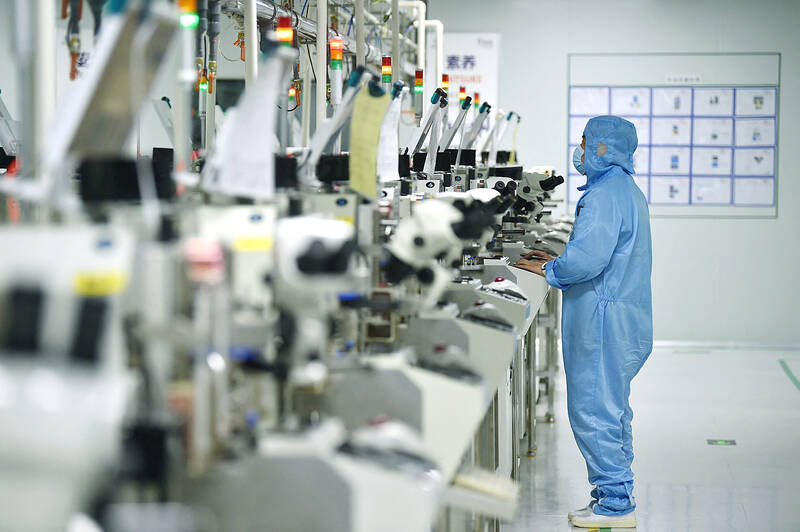China is considering new tax incentives for high-end manufacturing companies, person familiar with the matter said, as Beijing seeks to bolster the economy and encourage more innovation in technology to counter US competition.
The tax policy being considered could save advanced manufacturers hundreds of billions of yuan, said the person, who asked not to be identified because the information is not public.
The plan is still subject to approval and could change, the person said.

Photo: AFP
China’s post-COVID-19 economic rebound is losing momentum, with the latest data showing exports and investment weakening across the board, a recovery in the property market fizzling and unemployment among young people soaring to a record. Chinese stocks have slumped, the yuan has breached seven yuan to the US dollar, and prices of key commodities such as copper and iron ore have plunged as investors reassess the outlook for the world’s second-largest economy.
Chinese President Xi Jinping (習近平) cited a “modern industrial system” as one of China’s top economic priorities at a high-profile meeting earlier this month, prompting expectations that Beijing would roll out measures such as subsidies for manufacturers.
A Chinese State Council meeting this month also discussed supporting the country’s advanced manufacturing businesses, which covers a wide range of industries from new materials, chips and artificial intelligence to biopharmaceutics.
The Chinese Ministry of Finance did not immediately respond to faxed questions seeking information.
The government had previously announced tax breaks this year of 1.8 trillion yuan (US$254.3 billion), down from a record 4.2 trillion yuan last year as the economy gradually recovers.
A move to boost tax incentives suggests officials might be growing more concerned about the outlook.
The planned tax breaks for high-end manufacturers also provide further evidence that Beijing is prioritizing support for a sector that is key to supply chain security, particularly in semiconductors, as tension with the US and its allies intensifies.
Last year, the People’s Bank of China provided more than 200 billion yuan in relending loans for commercial banks to encourage cheap lending to manufacturers and other sectors.
Despite the government’s support, manufacturers have seen their revenues and profits squeezed because of falling demand. Factory activity contracted last month for the first time in four months, while data this weekend showed manufacturing profits plunged 27 percent in the first four months of the year from the same period last year.
However, the government’s ability to apply large-scale fiscal stimulus is limited. Revenue from land sales, a key source of income for local governments, has plummeted because of the downturn in the property market, while debt risks have climbed.
China’s tax income weakened to 13.8 percent of GDP last year from 17 percent in 2018 after the government made aggressive tax cuts in previous years to boost the economy.
Chinese Minister of Finance Liu Kun (劉昆) has said there could be “outstanding conflicts” between income and spending this year.

Nvidia Corp chief executive officer Jensen Huang (黃仁勳) on Monday introduced the company’s latest supercomputer platform, featuring six new chips made by Taiwan Semiconductor Manufacturing Co (TSMC, 台積電), saying that it is now “in full production.” “If Vera Rubin is going to be in time for this year, it must be in production by now, and so, today I can tell you that Vera Rubin is in full production,” Huang said during his keynote speech at CES in Las Vegas. The rollout of six concurrent chips for Vera Rubin — the company’s next-generation artificial intelligence (AI) computing platform — marks a strategic

REVENUE PERFORMANCE: Cloud and network products, and electronic components saw strong increases, while smart consumer electronics and computing products fell Hon Hai Precision Industry Co (鴻海精密) yesterday posted 26.51 percent quarterly growth in revenue for last quarter to NT$2.6 trillion (US$82.44 billion), the strongest on record for the period and above expectations, but the company forecast a slight revenue dip this quarter due to seasonal factors. On an annual basis, revenue last quarter grew 22.07 percent, the company said. Analysts on average estimated about NT$2.4 trillion increase. Hon Hai, which assembles servers for Nvidia Corp and iPhones for Apple Inc, is expanding its capacity in the US, adding artificial intelligence (AI) server production in Wisconsin and Texas, where it operates established campuses. This

Garment maker Makalot Industrial Co (聚陽) yesterday reported lower-than-expected fourth-quarter revenue of NT$7.93 billion (US$251.44 million), down 9.48 percent from NT$8.76 billion a year earlier. On a quarterly basis, revenue fell 10.83 percent from NT$8.89 billion, company data showed. The figure was also lower than market expectations of NT$8.05 billion, according to data compiled by Yuanta Securities Investment and Consulting Co (元大投顧), which had projected NT$8.22 billion. Makalot’s revenue this quarter would likely increase by a mid-teens percentage as the industry is entering its high season, Yuanta said. Overall, Makalot’s revenue last year totaled NT$34.43 billion, down 3.08 percent from its record NT$35.52

PRECEDENTED TIMES: In news that surely does not shock, AI and tech exports drove a banner for exports last year as Taiwan’s economic growth experienced a flood tide Taiwan’s exports delivered a blockbuster finish to last year with last month’s shipments rising at the second-highest pace on record as demand for artificial intelligence (AI) hardware and advanced computing remained strong, the Ministry of Finance said yesterday. Exports surged 43.4 percent from a year earlier to US$62.48 billion last month, extending growth to 26 consecutive months. Imports climbed 14.9 percent to US$43.04 billion, the second-highest monthly level historically, resulting in a trade surplus of US$19.43 billion — more than double that of the year before. Department of Statistics Director-General Beatrice Tsai (蔡美娜) described the performance as “surprisingly outstanding,” forecasting export growth